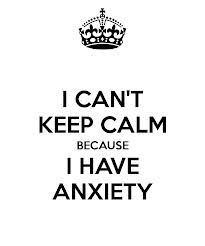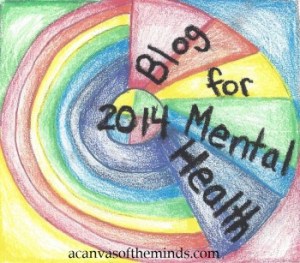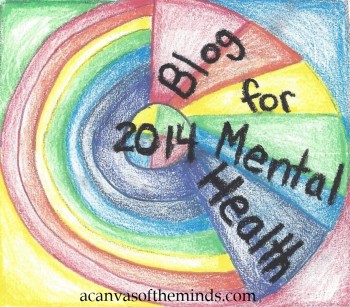
“I pledge my commitment to the Blog for Mental Health 2014 Project. I will blog about mental health topics not only for myself, but for others. By displaying this badge, I show my pride, dedication, and acceptance for mental health. I use this to promote mental health education in the struggle to erase stigma.”
Managing anxiety and panic attacks is extremely difficult, but certainly not impossible. As a sufferer of anxiety for many years (and possibly most of my life); I feel I have become somewhat of an expert; and at very least am quite knowledgeable on the subject. I suffered from debilitating anxiety and panic attacks in my early 20’s to the point where I was unable to leave the house for fear of either having a panic attack in public, or coming into contact with germs and contracting an illness. This was linked to a specific phobia based anxiety as opposed to the general anxiety I also suffered from.
So, how does one know when they have anxiety and following this, how does one deal with it? Firstly, clinical anxiety is a little more than experiencing stress or being nervous. When one suffers from anxiety they feel fear for an unknown or ‘irrational’ reason. However it must be highlighted that the anxiety sufferer does not see their fears as irrational; and in the case of one being afraid of flying for example, the fear of their upcoming plane flight is understandable. What is meant by having an irrational fear is not having the fear itself, such as fearing snakes or spiders, but being scared by snakes or spiders all of the time, even when they are not in your presence.
The anxiety sufferer constantly feels in a state of panic, or on the verge of it, and is often in a state of flight/fight response. They can experience elevated heart rate and breathing, palpitations, sweating, and muscle tension as the body prepares to either fight, or run from the perceived danger. Anxiety also effects one’s way of thinking, as negative and ‘irrational’ thoughts become the normal pattern of thinking. ‘What if’ and ‘catastrophic’ thinking is common as one worries about what bad things could happen in the future, as opposed to focusing on positive’s in one’s life or the good things that may happen in the future.
As stated managing anxiety can be difficult but the anxiety sufferer, with support and knowledge can eliminate or reduce symptoms and fears. Seeing a psychologist/psychiatrist or mental health worker is a good starting point and will determine what specific anxiety you may suffer from and how you may deal with it. Support groups are also available in most areas and can introduce you to others that know what you are experiencing and therefore empathise with your condition. Here you may also learn of how anxiety can vary greatly in its manifestations in each individual. While one person may suffer from general anxiety, another may suffer from phobias, and another post-traumatic stress disorder (PTSD); each with its own particular symptoms, and as with most things, as everyone is different, no one PTSD sufferer, for example, will experience the same symptoms either.
As well as talking to a professional and other sufferers of anxiety, it is also useful to talk openly and honestly to someone close to you such as your partner, parent or friend. It is of great benefit to have someone who is with you most times and can help you deal with your symptoms or panic attacks as they occur. For example, if you begin to fall into the trap of thinking negatively or irrationally, rather than battle with these thoughts on your own, express them to your partner or friend so that they may challenge or counteract your thoughts with more positive and realistic ones. It also important however as part of successful recovery that you are eventually able to challenge your own irrational/negative thoughts as you will not always have someone else to rely on for this. This is known as ‘self-talk’ and is an important key in treatment.
Gaining knowledge about anxiety and how it effects the body and mind is also helpful. Learning about what happens physiologically will reduce anxiety about what is happening to your body in the midst of a panic attack, and once one realises that the sensations you are experiencing are normal for your condition, the magnitude of attacks will likely be reduced. Fear of panic attacks can trigger a panic attack until it becomes a vicious cycle and increases risk of other conditions such as agoraphobia as one fears being in public whilst encountering an attack, or having an attack triggered by an outside stimulus. Using ‘self talk’ and repeating to yourself statements such as ‘this is just anxiety’, ‘this will pass’, or ‘this will not last forever’ when “under attack” will help gain a sense of control and lessen fear that panic attacks will always occur. Breathing exercises can also be of assistance; as anxiety sufferers will often breathe too much compensating for the belief they are not breathing enough, breathe in too quickly, or focus on breathing too much making it a conscious and laboured effort. For those who focus too much on their breathing a meditation based breathing exercise where one focuses on imagery rather than breath is recommended, while for those who ‘over-breathe’, inhaling, holding your breath for 5 seconds and then exhaling deeply is useful. For quick breathers calm breathing exercises are beneficial and will calm the body, and is where one takes deep, slow breaths until a more regular breathing pattern is established. hyperventilation is the most common form of breathing difficulty experienced in anxiety sufferers and this is generally what leads to a full-blown panic attack. When we hyperventilate we take in too much oxygen, and so cupping your hands over your mouth, putting your head between your knees, or as is often seen in movies and TV, breathing into a paper bag will help reduce the high levels of oxygen and increase depleted levels of carbon dioxide.
There are many other ways to manage anxiety, reducing stressors in life, practising yoga, meditation and self-affirmations, exposure therapy, exercise, a healthy diet, and various others depending on your anxiety and their roots. Just remember you are not alone, there are others experiencing the same or similar feelings and thoughts, and you will not always be a slave to anxiety, You can get better and in time you will.
Once you know the emotional building blocks of anxiety, you can influence them.
-Chip Conley
Please contact your local GP, mental health service or log on to www.beyondblue.org.au for assistance with managing anxiety.
Helpful Websites and Resources:
http://acanvasoftheminds.com/2014/01/07/blog-for-mental-health-2014/
www.mindspot.org.au 1800 614 436
http://www.sane.org/information/factsheets-podcasts/158-anxiety-disorders
http://www.beyondblue.org.au/the-facts/anxiety?gclid=COzU9Jje_LsCFcXFpAodgAoAwA


Mar 17, 2014 @ 05:36:17
I recently received an email stating that it had been reported that this article was not an original piece by me but a reprint of an article by another author! I am outraged. Any person who claims that this article is their work should be ashamed with themselves. I was unaware that you need to copyright blogs to protect your own work but this experience has shown me that copyright issues still apply in regards to blog articles; and not to trust that all people have integrity. I however do; and would never plagiarize another person’s work and can assure any reader of this article or any of my other blogs that anything contained within is 100% my own experiences, thoughts, words and knowledge.
Mar 17, 2014 @ 19:20:25
Again, my apologies for the role I played in this. You might find this link helpful to you: Prevent Content Theft — Support — WordPress.com. Meantime, I’ll continue to try to gather any additional information that I can to send to you.
Mar 17, 2014 @ 23:18:21
Thank you Ruby; please do not apologize; although I am hurt that this theft has happened to me I am pleased that I have you looking into it and brought it to my attention; as I would hate to think that my work was being shared elsewhere and accredited to another person. I hope together we can get this issue sorted out. =) xx
Oct 02, 2014 @ 21:17:39
I’ve just started a crowdfunding campaign to help me achieve my dreams and conquer my mental disorders. I need the the help of the mental health community, local & global, to make my dream a reality.
I suffer from Post Traumatic Stress Disorder, Social Anxiety Phobia, Depression, and Attention Deficit Hyperactivity Disorder. I have battled with these disorders since I was a child. The road to recovery has been a very long & painful one, & I’ve made a lot of breakthroughs in the past 5 years; but I’m not there yet. I still have a long, awkward, painful road ahead of me; filled with therapy, opening up, & being vulnerable.
I can’t even fully express the importance of what this campain means to me. If I succeed, I will have a much greater chance at a normal life. Even a small donation can make a big difference.
Even if you can’t donate you can still make a difference in my life. You can spread the word about my campaign & make some noise in the internet community & to those you know.
Check out my campaign at: http://igg.me/at/caseysdreams
& my facebook page at:
http://facebook.com/philosophercws7310
Thank you for reading this!